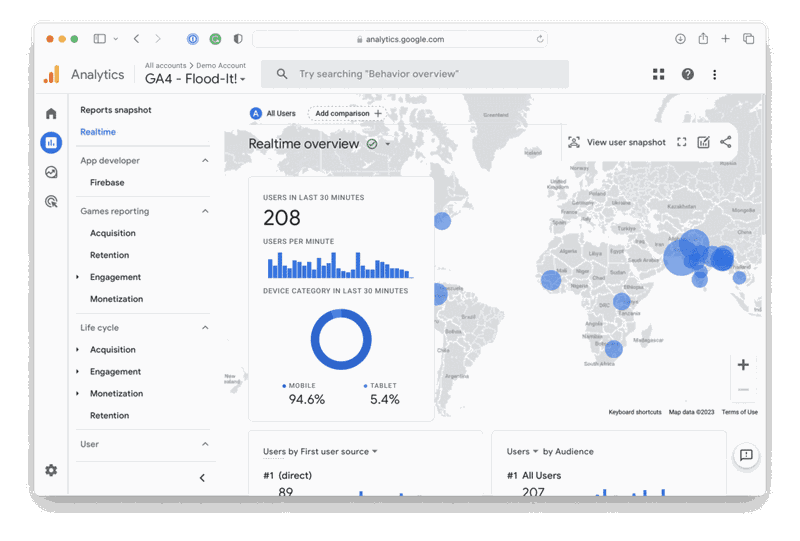Tools to Help You Define and Monitor Your Digital Marketing KPIs
Setting marketing KPIs is your road to success. Read this blog post to learn tools that will help you win at defining and monitoring your marketing KPIs.
Updated November 7, 2024

Measuring the success of your marketing campaigns has always been a tricky business. Digital marketing performance can be measured by a variety of metrics and an experienced digital marketing manager has an arsenal of marketing tools for every channel and occasion.
The challenge is to know which ones to use. If a marketing team doesn't have a way to measure a marketing activity, they have no way of knowing whether it was successful or not. And then you end up wasting your marketing spend.
Inbound marketing is all about measurement. Marketing analytics tools help you see how your digital marketing campaigns are performing along every step of your sales funnel. In this post, we break down all the different marketing tools you need to measure your campaigns.
Let's dive in.
Why are Marketing KPIs Important?
Key Performance Indicators are values used to monitor and track digital marketing performance. In many ways, setting KPIs (specifically marketing KPIs) is the road to your business's success.
Marketing KPIs are a window into what's working and what's not working in your marketing efforts. Without setting goals, it's hard for anyone to accomplish a task and measure how well they did it. Setting marketing KPIs is the optimal way to measure your successes and downfalls. You must invest time into understanding your marketing KPIs to know how you can better build your future marketing strategies for success.
9 Marketing KPIs you should be Measuring
Here are some marketing KPIs to keep in mind:
- Leads: This is a simple idea and one of the best marketing KPIs. As you acquire more leads, you have more sales opportunities. With more sales opportunities, there is a higher chance for sales growth.
- Lifetime Value of a Customer: Lifetime Value of a Customer (LTV) determines what your customer is worth to your business over the lifetime of your relationship. This marketing KPI is an optimal way to indicate you company's ROI. The information you gather from this KPI will help you build future business goals. Basically, figuring out how valuable your customer is over the lifetime of your relationship requires knowing all sales your average customer has initiated over the course of your relationship.
- Sales Team Response Time: The quality of a lead degrades as time passes. The faster your sales team responds to a lead, the more likely this will be a quality lead. This marketing KPI can help you improve your sale's team performance.
- Website Traffic to Website Lead Ratio: It's important to know how many website visitors convert and become leads. This KPI is helpful for measuring the quality of your website's traffic, and the conversion rate of your website.
- Social Media Reach and Engagement: Your social media strategy is one of the central parts of your marketing efforts. It gives you the opportunity to spread your content and interact with your current and future customers (but you probably know this already). A good way to measure this KPI is to track your growth, such as followers on Twitter and likes on Facebook. Now it's easy to track your growth with the built in tracking and analytics tools that social media platforms make available. For example, you could use a Twitter marketing tool to get all the data you need from your Twitter account. Note: not all social media outlets will work for your business, so make sure to monitor the ones that truly matter to you and your customers.
- Email Marketing Performance: Your email marketing strategy is the lifeline between you and your customer. Analyzing your email marketing strategy is one of the most important marketing KPIs. Analyzing your strategy includes paying attention to delivery rate, unsubscribe rate, open rate, click through rate, conversion rate, and forwards/shares.
- Inbound Link Building: When someone links to your website, it means you're building a strong reputation within your given industry. The more people link to your site, the better your search rankings and the more traffic your website will get from organic search.
- Landing Page Conversions: Landing pages on your website should be drawing people in and converting them into leads. A good way to assess whether or not your landing pages are effective is to analyze the amount of people who visit them, and whether your CTAs are converting them.
- Blog Posts Visits: If you know how well your blog posts are performing, you can better gauge what your customers like to read and when they like to read. This allows you to create content around your customer's wants and needs.
And there you have it, marketing KPIs at their finest. The next step is to plug all these KPIs into your sample marketing plan and start planning your tactics.
Now remember, you have to pick KPIs that align with your business goals. Otherwise, you will be putting a whole lot of effort and not bringing any value to you business. This is why monitoring your marketing KPIs is so important.
Why Monitoring Marketing KPIs is Critical to your Digital Marketing Success
Digitization is no longer the future of work, it's a present must. It's time for businesses to go digital with their production, sales, and marketing processes if they wish to survive. This challenge also presents a huge opportunity for marketers.
Using the latest innovations in technology, you can monitor the marketing KPIs you set, obtain measurable values of your campaigns’ performance, make more informed decisions, increase your odds at success, and boost your ROI.
Without regular monitoring of your marketing KPIs, you’d have no way of knowing how well your marketing efforts are actually paying off. Without keeping track of your marketing KPIs, you could potentially waste your time, efforts, and money.
Common Marketing KPIs Monitoring Mistakes to Avoid
Marketing KPIs are a digital marketer’s best friend. They are the marketing goals you have to set if you ever want to see them met.
- Mistake #1 - A common mistake in the digital marketing world is failing to set marketing KPIs all together.
- Mistake #2 - failing to define goals or leaving them too general. The more specific your marketing KPIs are, the easier it will be for you to understand if and why your marketing KPIs are or are not being met.
- Mistake #3 - that you absolutely must avoid is failing to monitor your marketing KPIs progress. How can you possibly know if you’ve met your goals, without tracking them and creating marketing reports for each campaign?
Avoid these mistakes and watch your business grow and prosper.
The Tools that will help you Master Marketing KPIs Monitoring Today
At Mayple, our team of experts are masters of everything digital marketing. We know of the latest, most comprehensive and advanced tools to help audit your past campaigns, define and monitor your KPIs, and manage your account, ensuring that you receive the best possible results.
Top Tools every Digital Marketer Should Know About and Use
Here are some of the most popular marketing measurement tools that every marketer should use:
Google Analytics - The world’s most used analytics monitoring tool, Google Analytics (its basic version), is free to use, provides a clear view of all major metrics from a single dashboard, and generates reports for your convenience. Monitoring your marketing KPIs has never been easier!
Youtube Analytics - Stay on top of your video content published on YouTube, with YouTube Analytics. The tool’s insightful platform sheds a light on major video marketing KPIs, including watch time, traffic sources, audience demographics, playback locations and other engagement metrics, all in real-time.
Facebook Page Insights - With Facebook Page Insights, you can see how your business page is doing, and set your marketing KPIs to optimize your Facebook results. Discover how many people see your posts, which posts people engage with most, how well each post performs, which actions are being taken on your page, and more.
Your CRM - Your CRM keeps track of all customer's touch points, so be sure to use a CRM that covers the whole business, not just customer communication. Categorize interactions according to groups such as leads, opportunities, paying customers, MQL, SQL, to enable comparisons that will inform future marketing decisions and help you better define your marketing KPIs.
Email marketing tools - MailChimp, Constant Contact, ConvertKit, and others provide great email marketing services, while also shedding a light on how your email marketing campaigns are performing across your pre-defined marketing KPIs. Select the best email marketing tool that helps you engage your target audience and meet your business's unique needs.
Social media marketing tools - You need to use tools to measure the marketing data from each of your social channels. Use tools that can measure your brand mentions, measure audience engagement and traffic coming from each social media platform, create marketing reports, and offer analytics dashboards here you can compare each channel and see what you need to improve.
Content marketing tools - content marketing ROI is notoriously difficult to measure. A good content marketer uses a variety of SEO, CRO and content distribution tools to measure which pieces of content generated leads and which need improvement. Tools like Ahrefs and Semrush measure the amount of inbound links and display your search rankings. Tools like Google Analytics can help you measure bounce rates, traffic from each channel, and the overall user experience on your site. Google Search Console is another great tool to help you optimize the performance of your site and of your content.
Advertising tools - every digital marketer needs the right tools to measure traffic coming from ads. These could include reporting tools like Google Data Studio that aggregates all the data from each marketing channel (Google ads, Facebook ads, Amazon Advertising, banner ads, you name it). Twitter analytics just won't do here. You need a robust tool that analyzes all of your campaigns, breaks them down by campaign URL, helps measure your AB tests, and helps implement changes to improve your ROI.
Advanced Tools
Funnelytics - Funnelytics is an analytics tool that was built by digital marketers, for digital marketers. It maps funnels with speed and ease, so you can best understand how your campaigns are performing . Share them with your clients to drive the message home, for free.
Hootsuite - Designed as a social channel management platform, Hootsuite enables marketers to enjoy its reporting functions, making it extremely easy to understand social campaigns’ performance and ROI results. Hootsuite helps you schedule social media posts and get a handle on your brand awareness by providing insights on mentions of your brand on social media, and tells you whether they’re positive, negative, or neutral. It also helps you keep track of marketing trends in your niche and be first on the scene of new topics and conversations.
HotJar - With HotJar, you can visually understand your users, track and monitor marketing KPIs, get realtime data, and make better decisions. And as HotJar integrates with many other digital marketing tools and apps, you can turn generated insights into action. Their heatmaps tool is something you should definitely check out.
Fullstory - Much like a DVR, Fullstory replays your customer's journey, so you can see their user experience through their eyes, gain access into what does and doesn’t work for them, and make the necessary modifications to your campaigns. Insights that scream marketing KPIs success.
Frase - Frase is a great SEO tool that helps you improve your search rankings and increase your organic traffic. It helps display a measure of your content effectiveness by comparing your piece of content with top ranking content on search engines for specific keywords.
Takeaways
Defining and monitoring your digital marketing KPIs is critical to your campaigns and business's success. Discover how the Mayple team can help you realize your marketing KPIs like never before. Contact us Today! Digital marketing is one of the most popular and successful ways for businesses to make and increase sales. But how can a business know that their efforts are paying off? How can they be certain that their digital marketing activities are meeting operational goals? That's why you need marketing KPIs and marketing measurement tools to keep track of them. With our list of tools, measuring success has never been easier.
FAQs
How do you measure marketing?
There are several metrics to measure when you're running a digital marketing campaign. A marketing manager usually sets up tools for measuring the traffic, leads, conversion rate, and other metrics of success. Marketing KPIs include:
- Website traffic
- Visitor-to-lead conversion rate
- Bounce rate
- Acquired customers / leads
- Engagement
- Brand mentions
- Unique visitors
- Returning visits / purchases
- Keyword rankings
- And many more.
What are the 5 marketing tools?
Here are the 5 most important marketing tools to help you improve your marketing campaigns.
1. Social media - tools that help you schedule your social media content, measure content on each social channel, track your brand mentions and get better at distributing your content across a variety of platforms.
2. Content marketing - tools that help you execute your content marketing strategy and measure your content's effectiveness. These include publishing tools, CMS, SEO tools, analytics tools to measure content marketing ROI and display competitive insights, and content promotion and distribution tools.
3. Email marketing - tools that help you send email campaigns and automate marketing flows to a variety of customer segments.
5. Display advertising tools - tools that help you measure your display ad campaigns, run A/B tests, change the copy and creatives, research audience insights, and view your results in one comprehensive dashboard.
Most tools can be purchased on a monthly subscription basis and some are even free.
What are marketing metrics?
Marketing metrics are measurable values that marketing teams use to prove the success or failure of their projects and campaigns across a variety of marketing channels. There are metrics for each marketing campaign a team uses.
Marketing managers usually set KPIs and then report on them throughout the year. These can include the amount of paying customers, website visitors, leads, the conversion rate, social engagement, the engagement rate on the site, average time to purchase, or any variety of metrics.





